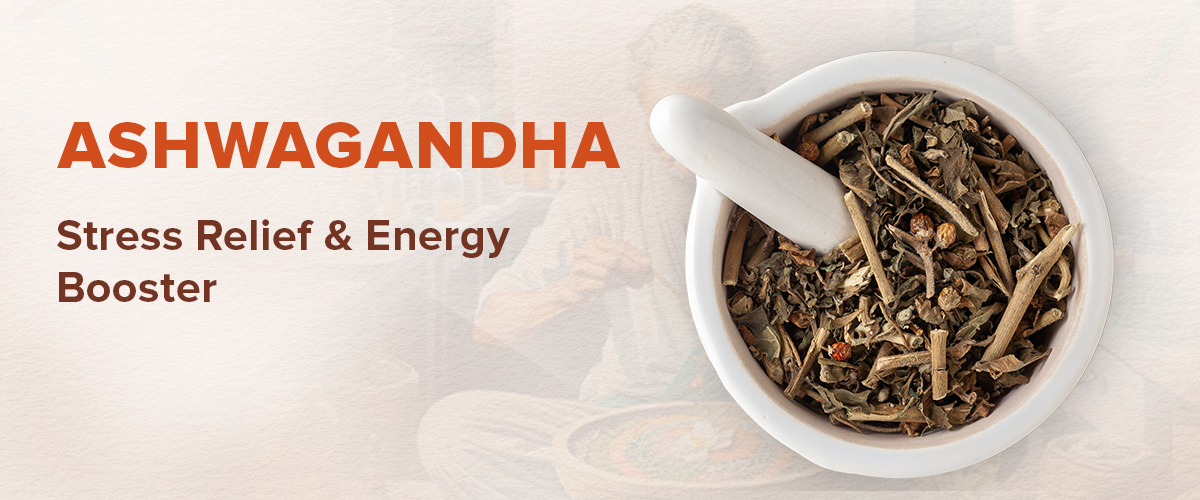Ashwagandha: Benefits, Uses, and Healing Properties

Ashwagandha is one of the most well-known Ayurvedic herbs. In botany, it is called Withania somnifera, and in Sanskrit, it is called Ashwagandha. People have used this strong root, which is often called Indian ginseng, for thousands of years to help the body and mind in natural ways.
Recent studies prove that these old claims are true with real people as evidence. A clinical trial and systematic review with more than 1,000 people found that taking 300–600 mg of Ashwagandha every day can greatly lower stress and anxiety.
Ayurvedic texts say that Ashwagandha is a Rasayana. This means it is a herb that helps you feel stronger, more alive, and live longer. It is best known for helping to lower stress, improve sleep, boost immunity, and support overall health. Due to its varied uses and benefits, Ashwagandha is becoming more popular in modern wellness practices.
What is Ashwagandha & What are its Ayurvedic Properties?
Ayurveda has a detailed way of describing each herb based on its taste, qualities, strength, and what it does after you eat it. This helps you learn how it works in your body, and Ashwagandha is the same way.
- Taste: Ashwagandha has a bitter and astringent taste. If you eat it as a powder, you might notice that it has a natural flavour that is earthy and a little sharp.
- Guna (Qualities): It is heavy (guru) and greasy (snigdha) in nature. These traits help your body get the nutrients it needs, give you more energy, and calm your mind when it's overthinking or anxious.
- Virya (Potency): Ashwagandha has a hot (ushna) potency. This means it makes you feel warm and is great for balancing conditions that are caused by the cold and speeding up your metabolism.
- Vipaka (Post-Digestive Effect): Its sweet (madhura) vipaka shows that it has long-term nourishing effects. It helps you get stronger, makes your reproductive health better, and helps your tissues heal over time.
Ashwagandha Benefits for Your Health
There are a number of health benefits of ashwagandha for our body and mind. Let's look at how it helps different components of your health from both Ayurvedic and modern research points of view.
1. Stress Relief and Mental Health
From the Ayurvedic point of view: Ayurveda says that having trouble sleeping, being anxious, or being stressed out are all signs that your Vata dosha is out of balance. Ashwagandha calms down your nervous system, which helps the mind and body find balance.
Modern view: Ashwagandha is an adaptogen, which means it helps your body handle stress. It lowers cortisol, the hormone that makes you feel stressed, and makes you feel better overall. This herb can help you feel more in control and less anxious if you often feel that way.
2. Get Better Sleep
Ashwagandha might help if you have trouble falling asleep or if you wake up tired a lot.
Ayurvedic point of view: It helps you sleep well and deeply because it calms your Vata and has Rasayana qualities.
As per the modern view, studies show that Ashwagandha can help you sleep better, fall asleep faster, and have better sleep cycles over time.
3. Supports the Immune System
According to Ayurveda: For good health and a strong immune system, your ojas needs to be in balance. Ashwagandha helps build ojas by nourishing the body's tissues.
Modern view: The modern view is that ashwagandha boosts white blood cells, especially natural killer cells, which help your body fight off infections. It also helps boost the immune system by reducing inflammation and fighting free radicals.
4. Improves Sexual and Reproductive Health
From an Ayurvedic point of view: As per Ayurveda, Ashwagandha is a Vajikarana (aphrodisiac). It improves the quantity and quality of sperm in men and it also helps women keep their hormones in check.
Modern studies show that Ashwagandha can raise testosterone levels in men and help women balance their reproductive hormones, especially when they are having hormonal problems because of stress.
5. It Gives You More Strength and Energy
Ayurvedic view: Ashwagandha is a Balya herb, which means it boosts your energy and strength.
In the modern view, ashwagandha can help you build muscle, recover from working out, and feel less tired. People who work out a lot and athletes often use it to boost their performance and stamina.
6. Good for the Thyroid and Metabolism
From an Ayurvedic point of view, a slow metabolism and problems with the thyroid are often thought to be related to Kapha. Ashwagandha's warm nature and ability to speed up metabolism help in these situations.
Modern view: Research shows that Ashwagandha may help your thyroid work better, especially in people with hypothyroidism (an underactive thyroid). It can help raise T4 hormone levels in your body.
Ashwagandha for Specific Health Conditions
Here are some ways that Ashwagandha can help with some health issues:
Anxiety and Depression
If you have anxiety or depression, ashwagandha can really help. Ayurveda calls it a Medhya Rasayana, which means it helps the brain and calms the nervous system, especially when Vata dosha is not in balance.
Weight Gain and Weight Loss
For underweight individuals, it improves digestion, strengthens nutrient absorption, and encourages healthy muscle growth. On the other hand, for those dealing with excess weight, particularly due to stress, PCOS, or low metabolism, it helps by reducing cortisol levels and supporting metabolic balance.
Brain and Memory
It is believed that ashwagandha improves memory, focus, and mental clarity by nourishing the mind and making it feel refreshed. Studies have shown that using Ashwagandha regularly can help with memory, attention span, and even protect against cognitive decline that comes with age.
Diabetes
Ashwagandha can be a useful companion for those managing type 2 diabetes. It helps regulate blood sugar levels, reduces internal inflammation, and improves how the body responds to insulin. These benefits may help reduce dependency on medication over time, but it is important to use Ashwagandha under expert supervision.
Polycystic Ovary Syndrome (PCOS)
Women with PCOS often have trouble with their hormones, stress, and getting their periods on time. Ashwagandha helps with these main issues by balancing hormones that are out of balance because of stress, supporting regular ovulation, and giving you more energy.
Problems with the Thyroid
Ashwagandha helps the thyroid gland by helping the body make more T4 hormone. This can make your metabolism, energy, and mood better. If you have hyperthyroidism (an overactive thyroid), you shouldn't take Ashwagandha unless an Ayurvedic practitioner tells you to. This is because it could make their already active thyroid even more active.
Who Should Use Ashwagandha?
According to age and gender, here are the people who should use Ashwagandha:
Ashwagandha For Women
Helps with PCOS, menopause symptoms, hormonal imbalance, and tiredness. Helps you sleep better, lowers hormonal changes caused by stress, and makes you feel more stable emotionally.
Ashwagandha For Kids
Safe in small amounts for kids over 5, but only with expert help. Helps hyperactive kids stay calm, focused, and healthy.
Ashwagandha For Older People
Helps the immune system, boosts energy, memory, and muscle strength. Also helpful for problems with sleep and tiredness that comes with getting older.
Can You Use Ashwagandha with Other Drugs?
Generally, it's safe to take ashwagandha with modern medicines, but it's always best to talk to an Ayurvedic expert first, especially if you're already taking medicine for diabetes, thyroid problems, anxiety, or high blood pressure.
In these situations, Ashwagandha may change how your current medications work or interact with them. Also, pregnant or breastfeeding women should not take it unless a qualified Ayurvedic practitioner tells them to.
Is Ashwagandha Safe? Who Should Avoid It?
Most people can safely take ashwagandha if they take the right amount. Like any other herb or supplement, you should know when and how to use it right.
Possible Side Effects
If you take too much of it or in rare cases, you could have these issues:
- Stomachache
- Feeling bad or throwing up
- Diarrhoea (loose motions)
- Tiredness
If you notice any of these signs, stop taking the herb and see an Ayurvedic doctor.
Ashwagandha vs Other Herbs
Here is a simple comparison between ashwagandha and other herbs:
Ashwagandha vs Shilajit
|
Feature |
Ashwagandha |
Shilajit |
|
Best for |
Stress, sleep, balance |
Energy, strength, libido |
|
Nature |
Cooling + building |
Heating + energising |
Ashwagandha vs Brahmi
|
Feature |
Ashwagandha |
Brahmi |
|
Best for |
Stress, energy, sleep |
Focus, memory, calm mind |
|
Action |
Calming + restorative |
Cooling + mind-enhancing |
Conclusion
Your body knows how to heal itself, but sometimes it needs a little help. Ashwagandha is one of these strong herbs that can help you deal with stress, give you more energy, help you sleep better, and improve your overall health in a natural way. But just like any other treatment, what works for one person might not work the same way for another.
That's why you shouldn't treat yourself, even with something as natural as Ashwagandha. A Jiva certified Ayurvedic expert can tell you how much to take, when to take it, and if it's good for your body type and health.
If you have any questions regarding Ashwagandha or have any other health concerns, talk to our specialist doctors today. Call us on 0129-4264323.
FAQs
What does ashwagandha do for men?
Ashwagandha might help improve testosterone levels, sperm health, and stamina. It can help you feel better if you're tired or stressed out.
What is ashwagandha used to cure?
Ashwagandha can help with stress, fatigue, bad sleep, a weak immune system, and hormonal problems. Don't think of it as a replacement for medicine; think of it as a natural support.
Is ashwagandha good for skin?
Yes, it might help your skin by lowering stress and inflammation from the inside. If you use this regularly as part of a healthy routine, it can help your skin look clearer and better over time.
Is it safe to take ashwagandha every day?
Yes, a lot of people safely take it every day for long-term help. Start with a small dose and stop if you feel any issues. It works best when you do it under the guidance of a Jiva certified Ayurvedic doctor.
Can ashwagandha be taken during periods?
Ashwagandha is generally safe, but take expert advice if you have painful or irregular periods.

































